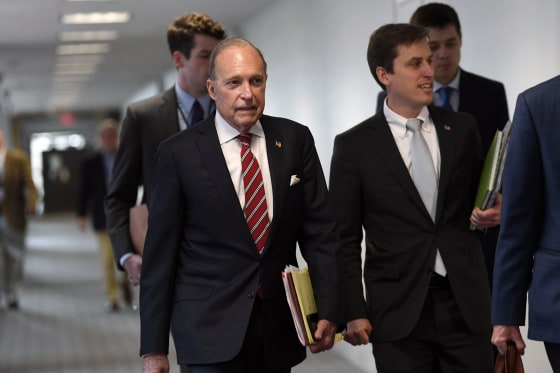WASHINGTON — President Donald Trump’s top economic adviser, Larry Kudlow, said that the new economic emergency package to combat the coronavirus pandemic could total more than $2 trillion.
“The package is coming in at about 10 percent of GDP,” Kudlow said to reporters as he arrived at the Capitol Saturday morning to continue negotiating a deal with a bipartisan group of senators, adding that it would likely come out to be more than $2 trillion.
“We’re just trying to cover the right bases,” he said, declining to provide any further details on what agreements Senate Republicans and Democrats were nearing.
Kudlow later clarified that actual stimulus package would be between $1.3 and $1.4 trillion, and the rest of the $2 trillion figure would be through the Federal Reserve Loans and Economic Stabilization Fund.
Lawmakers spent all Friday meeting in the Capitol to hammer out a deal, but failed to reach Senate Majority Leader Mitch McConnell’s ambitious midnight deadline to come to an agreement. They reconvened Saturday morning to finish negotiations.
"As of now, an agreement has yet to be finalized but our committee chairs, their Democratic counterparts and President Trump's representatives are making important progress," McConnell said Saturday.
White House Legislative Affairs Director Eric Ueland, Labor Secretary Eugene Scalia, Treasury Secretary Steven Mnuchin, as well as Kudlow, were at the Capitol to participate in the bipartisan negotiations.
The Congressional Budget Office, the nonpartisan agency that analyzes cost estimates of legislation, is expected to announce its score today for the unemployment insurance part of the deal, according to Ueland.
“I'm hopeful that we understand more about the unemployment insurance piece today, including its cost, its potential scope and some of these technical challenges that we've outlined,” Ueland said.
Lawmakers expressed optimism that they could reach a deal by Saturday afternoon, making way for a final vote to take place as early as Monday.
Legislation rarely moves this fast in Washington, especially for a bill of this size. But both parties appeared motivated to act quickly as unemployment numbers continue to rise and more and more businesses are forced to close their doors.
"We need to work with uncommon speed and make this next bill what it needs to be," Schumer said on Friday.
Schumer, who criticized McConnell for delaying the process by not bringing Democrats into negotiations from the very beginning as had been the case with previous coronavirus bills, said that the GOP’s initial proposal gave too much to industry bailouts and not enough to unemployment insurance, paid leave and resources for hospitals.
The scope of unemployment insurance continued to be a sticking point for Republicans and Democrats as they worked to come to a deal.
Some Republicans, including Sens. Mitt Romney of Utah and Josh Hawley of Missouri, also took issue with a provision in the GOP proposal that would provide less money in direct payments to low-income Americans.
Whatever agreement Senators reach will also need support from the Democratic controlled House. Speaker of the House Nancy Pelosi kept in close contact with Schumer and Mnuchin from her San Francisco district throughout the negotiation process, speaking with both of them by phone multiple times.
The House, whose members are currently at home, will need to decide on how they plan to vote on the bill. Two members announced earlier this week that they had been diagnosed with the coronavirus, forcing a handful of their colleagues who had been in close contact with them to self-isolate for the recommended two week period.
House Majority Leader Hoyer, D-Md., said he was exploring remote voting options in order to reduce the spread of infection, but no clear decision has been made.


